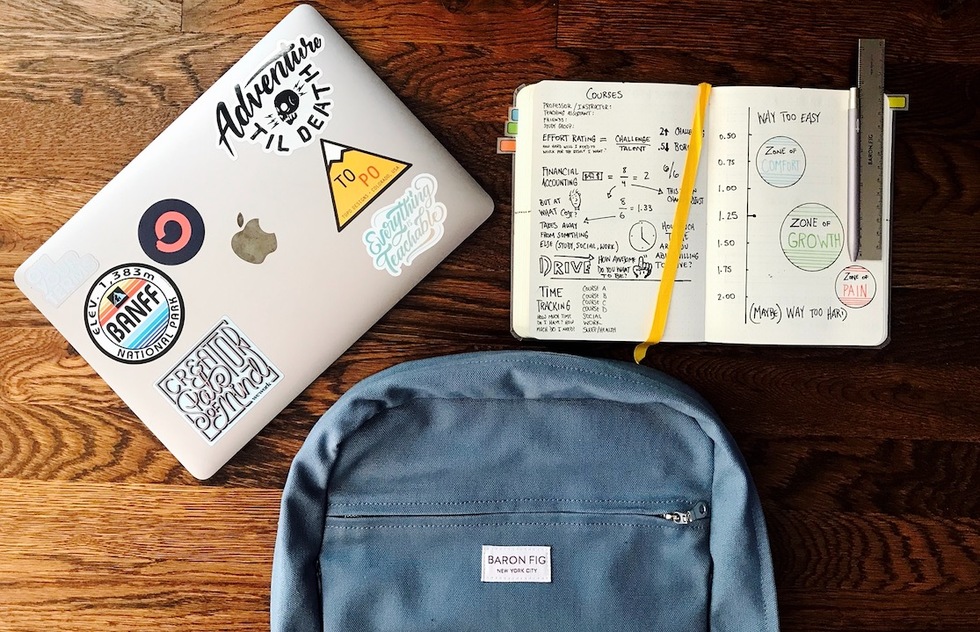Undergrads who study abroad usually return home raving about the personal growth they achieved, the stunning cities they visited, and the tons of fun they had. What you rarely hear about: how getting a student visa can be a stressful and complicated ordeal, especially if you’re not prepared.
Don’t worry—we’ve got tips to help you navigate the visa process and ensure a smooth start to an experience you’ll never forget.
When do you need a student visa?
Typically, if you plan to be studying abroad for over 3 months (90 days), you’ll need a visa. Not every country has an intense visa application process for U.S. citizens—Ireland, for example, doesn't require Americans to complete in-person interviews—but other countries make study-abroad prospects fill out tons of paperwork, assemble an array of documents, and pay a visit to a local consulate general before granting permission to study.
5 steps for getting a student visa
1. Find the nearest consulate. The consular website of the country you’re visiting is easily accessible via internet search and should have detailed info about what the application process entails. Additionally, your educational institution usually offers resources to help with this step; if you’re confused, contact your school's Study Abroad office.
2. If required, make an appointment for your in-person interview. Most countries have consulate locations in major American cities. If you live far from a consulate, you’ll need to travel—substituting a phone interview for an in-person appointment is not allowed.
Book a consular appointment ASAP after being accepted to your abroad institution. Consulates for popular study-abroad locations, such as Spain and Italy, advise scheduling an appointment 90–45 days before your departure, but slots fill up fast. Book NOW.
3. Gather your documents. On the consulate’s website, there should be a detailed checklist of documents to present at your appointment. If you can’t find this checklist, or it’s not available in English, check sites run by major consulates in different American cities to get an idea of what you’ll need.
Required documents will likely include:
- The visa application
- Your passport and two glossy passport photos
- Proof of acceptance at an educational institution in your intended country
- Transcript or proof of enrollment from your current school
- Proof of lodging (printouts of hotel reservations work for this; alternatively, you could submit a photocopy of your host’s passport along with the host’s written consent that you’ll be staying there)
- Proof of health insurance
- Proof of sufficient funds (bring three months’ worth of personal bank statements)
- Prepaid, addressed envelope in which the consulate will mail your passport back to you
Bring all required materials to your appointment. If you’re missing important documents, like your passport or physical application, you will have to make another appointment and come back. If you’re missing more minor documents, like proof of health insurance, you might be able to drop those off later or email PDF versions.
At your appointment, you will wait in a line and then the person behind the counter will likely ask you to hand over your documents in a certain order. Be prepared to verify the validity of everything.
4. Pay the fee. The amount required to process your application varies by country, but is usually somewhere in the neighborhood of $50–$200. France and Italy are at the cheaper end of that range, China and Brazil at the higher end. Australia charges more than $400, but that's an outlier. Many consulates don't accept credit cards for payment, so the safest thing to bring is a money order for the fee amount. That might be required anyway.
5. Wait to get your visa in the mail. Once all your documents are in order, the consulate will send your passport back to you by mail with your study visa pasted inside. If you submitted a prepaid, addressed envelope, the length of your wait depends on how much money you spent on shipping—with the more expensive 2-day shipping option, you’ll obviously receive your visa right away; standard shipping shouldn't take longer than a couple weeks.
Some consular websites warn, however, that visa processing can take up to six weeks. So don't wait until the last minute.
Troubleshooting tricks
All in the timing:
If you can’t get a consulate appointment before your departure date, all is not lost. You might be able to snag a cancellation. Consulates handle this in different ways—the Italian consulate, for instance, posts canceled appointments online each day at 6pm. As hopeless as the process may feel due to unmanned phones at the consular offices and full email inboxes, keep checking every day and odds are good you’ll get an appointment. Barring that, you can go with visa appointment help sites like Favisbook, but the fees for those services can be ridiculously expensive.
There are also visa expediting services, such as Swift and CIBTvisas, that cannot make appointments for you, but can review all your documents to make sure you have everything in order—for a fee, of course.
All in the timing, continued:
Expect to be at the consulate all day, even if you have an early appointment. Consulates run notoriously behind schedule—it’s not unheard of to spend five hours or more in line. Also, if you’re missing documents, you’ll be forced to rush around the city making copies. If you have a job, take the day off.
Bring a buddy:
If someone is willing to accompany you to your appointment, by all means bring that person with you. Although you’ll be on your own for the interview (and will probably have to relinquish your cell phone), it’s useful to have a point person on the outside, in case you don’t have all the necessary materials. Your friend or parent can work to gather missing documents while you wait in that interminable line.






